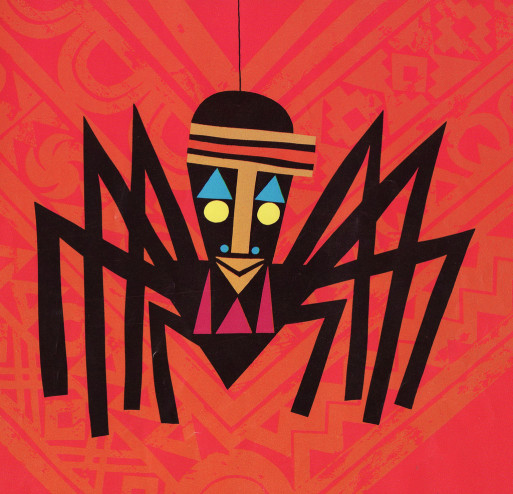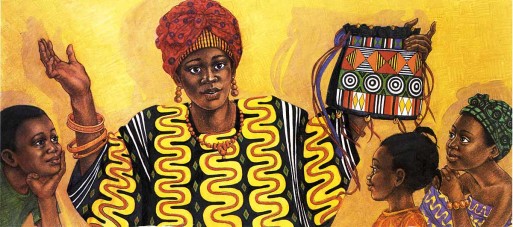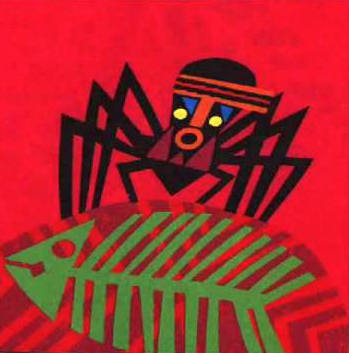
Credit: Anansi the Spider: A Tale from the Ashanti by Gerald McDermott
By far the most iconic character in traditional African folktales is Anansi, the trickster spider god. His wit and charm got him out of thousands of seemingly impossible situations, which earned him a place in nearly every story told by the Asante people of Ghana. Eventually, Anansi became the god of stories, and nearly every child in Ghana had a favorite tale of his adventures.
During the 15th century, when thousands of people from Ghana were forcibly taken from their homes to work as slaves, tales about Anansi spread from West Africa to the Caribbean. Jamaica was the final destination for many of the families abducted for the slave trade, and often the only things they carried with them were their fables. As the slaves endured years of oppression, Anansi slowly transformed from a fictional character who taught life lessons through humor, into a symbol of resilience and rebellion, and the stories reflected this.
One such tale was “Anansi and Brother Death.” In the story, Anansi the spider comes across a house with an old man sitting at the entrance. The man is so thin and frail, he looks like a pile of skin and bones.
Anansi asks the man if he can have some water, but the man doesn’t respond.
Anansi asks the man if he can have some water, but the man doesn’t respond. Being the charming trickster he is, Anansi takes his lack of an answer as an enthusiastic “Yes,” and proceeds to enter the house, drinking water and eating the delicious food inside. The spider returns to eat at the house every day for a week.
One day, Anansi offers the old man his oldest daughter as a wife so that she can cook meals for Anansi whenever he visits. The old man accepts, but when Anansi returns to the house the next morning, he finds that the old man has eaten his daughter. It turns out the old man is actually “Brother Death,” and that Anansi had unwittingly invited himself and his family into Death’s home.
Death chases Anansi through the village and into Anansi’s home. The spider tells his family to climb onto the ceiling to avoid Death. Brother Death sits on the floor, waiting for the spider family to drop. One-by-one, each member of Anansi’s family loses its grip on the ceiling and falls into Death’s burlap sack.
One-by-one, each member of Anansi’s family loses its grip on the ceiling and falls into Death’s burlap sack.
Anansi is the last one holding on to the ceiling when he tells Death that he is so full from eating his food that his body will shatter if he falls to the floor. Since Death wants to eat Anansi, Death agrees that allowing Anansi to fall is a bad idea. Anansi tells Death to put a barrel of flour under him to break his fall, but when Death does this, Anansi jumps on his head and pushes Death’s face into the flour. This gives him just enough time to escape with his family.
This story began as a whimsical explanation of why spiders crawl and build webs on ceilings. But when families were forced into the slave trade, the story took on a new meaning. The Asante people saw Anansi as the embodiment of power. His defeat of Death allowed them to carry on, even as their loved ones died as a result of the horrific conditions they all endured.

Credit: janiceskivington.blogspot.com
The fable also held another lesson for the Jamaican people: It acted as a warning against killing and revenge. As the elders told and retold the story of Anansi and Brother Death, it reinforced the moral that, when someone seeks to harm or kill another, the people who are usually harmed in the end are those closest to the person who’s trying to do harm. The story explains that Death impacts everyone it touches, so it is best not to seek it out.
Today, “Anansi and Brother Death” is one of the most famous stories in Jamaica. Without it and others like it, the culture of the Asante, the ancestors of so many Jamaicans, would be lost. Even today, Anansi gives the people of Jamaica a proverbial ceiling to climb on, allowing them to face death with dignity and their traditions intact.

 The Ultimate Trickster God Faces Death
The Ultimate Trickster God Faces Death



 “Help Me, Helen”
“Help Me, Helen”
 Recovering Cremation Remains After the Los Angeles Fires
Recovering Cremation Remains After the Los Angeles Fires
 “As Tears Go By” by Marianne Faithfull
“As Tears Go By” by Marianne Faithfull














